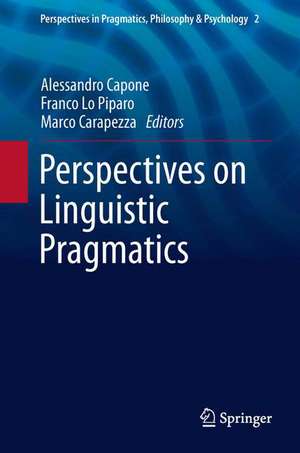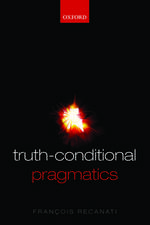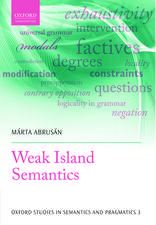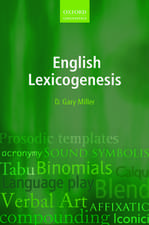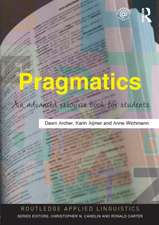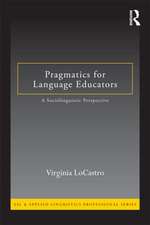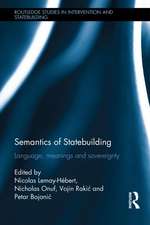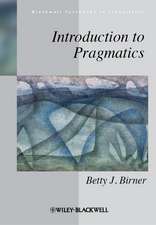Perspectives on Linguistic Pragmatics: Perspectives in Pragmatics, Philosophy & Psychology, cartea 2
Editat de Alessandro Capone, Franco Lo Piparo, Marco Carapezzaen Limba Engleză Hardback – 11 dec 2013
This book follows on from the first volume: both contain the work of world renowned experts who discuss theories relevant to pragmatics. Here, the relationship between semantics and pragmatics is explored: conversational explicatures are a way to bridge the gap in semantics between underdetermined logical forms and full propositional content.
These volumes are written in an accessible way and work well both as a stimulus to further research and as a guide to less experienced researchers and students who would like to know more about this vast, complex, and difficult field of inquiry.
| Toate formatele și edițiile | Preț | Express |
|---|---|---|
| Paperback (1) | 957.32 lei 6-8 săpt. | |
| Springer International Publishing – 27 aug 2016 | 957.32 lei 6-8 săpt. | |
| Hardback (1) | 963.60 lei 6-8 săpt. | |
| Springer International Publishing – 11 dec 2013 | 963.60 lei 6-8 săpt. |
Din seria Perspectives in Pragmatics, Philosophy & Psychology
- 24%
 Preț: 628.51 lei
Preț: 628.51 lei - 24%
 Preț: 825.97 lei
Preț: 825.97 lei - 18%
 Preț: 959.98 lei
Preț: 959.98 lei - 18%
 Preț: 1023.28 lei
Preț: 1023.28 lei - 20%
 Preț: 572.65 lei
Preț: 572.65 lei - 15%
 Preț: 656.43 lei
Preț: 656.43 lei - 18%
 Preț: 729.23 lei
Preț: 729.23 lei - 18%
 Preț: 955.08 lei
Preț: 955.08 lei - 15%
 Preț: 647.59 lei
Preț: 647.59 lei - 15%
 Preț: 586.05 lei
Preț: 586.05 lei - 15%
 Preț: 704.04 lei
Preț: 704.04 lei - 18%
 Preț: 904.11 lei
Preț: 904.11 lei - 15%
 Preț: 662.16 lei
Preț: 662.16 lei - 15%
 Preț: 636.63 lei
Preț: 636.63 lei - 15%
 Preț: 528.80 lei
Preț: 528.80 lei - 15%
 Preț: 643.84 lei
Preț: 643.84 lei - 15%
 Preț: 634.32 lei
Preț: 634.32 lei - 18%
 Preț: 729.53 lei
Preț: 729.53 lei - 15%
 Preț: 653.46 lei
Preț: 653.46 lei - 15%
 Preț: 582.12 lei
Preț: 582.12 lei -
 Preț: 490.46 lei
Preț: 490.46 lei - 5%
 Preț: 721.40 lei
Preț: 721.40 lei - 18%
 Preț: 779.39 lei
Preț: 779.39 lei - 15%
 Preț: 705.65 lei
Preț: 705.65 lei - 24%
 Preț: 745.28 lei
Preț: 745.28 lei - 18%
 Preț: 726.06 lei
Preț: 726.06 lei - 18%
 Preț: 725.61 lei
Preț: 725.61 lei
Preț: 963.60 lei
Preț vechi: 1175.12 lei
-18% Nou
Puncte Express: 1445
Preț estimativ în valută:
184.39€ • 197.17$ • 153.74£
184.39€ • 197.17$ • 153.74£
Carte tipărită la comandă
Livrare economică 17 aprilie-01 mai
Preluare comenzi: 021 569.72.76
Specificații
ISBN-13: 9783319010137
ISBN-10: 3319010131
Pagini: 550
Ilustrații: XXII, 543 p. 7 illus.
Dimensiuni: 155 x 235 x 38 mm
Greutate: 0.97 kg
Ediția:2013
Editura: Springer International Publishing
Colecția Springer
Seria Perspectives in Pragmatics, Philosophy & Psychology
Locul publicării:Cham, Switzerland
ISBN-10: 3319010131
Pagini: 550
Ilustrații: XXII, 543 p. 7 illus.
Dimensiuni: 155 x 235 x 38 mm
Greutate: 0.97 kg
Ediția:2013
Editura: Springer International Publishing
Colecția Springer
Seria Perspectives in Pragmatics, Philosophy & Psychology
Locul publicării:Cham, Switzerland
Public țintă
ResearchCuprins
Chapter 1. Noel Burton-Roberts, Meaning, semantics and semiotics.- Chapter 2. Louise Cummings, Clinical pragmatics and theory of mind.- Chapter 3. Nicholas Allott, Relevance Theory.- Chapter 4. Alison Hall, Relevance theory, semantic content and pragmatic enrichment.- Chapter 5. Alessandro Capone, Explicatures are NOT cancellable.- Chapter 6. Alessandro, Capone, The pragmatics of indirect reports and slurring.- Chapter 7. Eleni Gregoromichelaki and Ruth Kempson, Grammars as processes for interactive language use: incrementality and the emergence of joint intentionality.- Chapter 8. Yan Huang, Logophoricity and neo-Gricean truth-conditional pragmatics.- Chapter 9. Eros Corazza, Some notes on point of view.- Chapter 10. Keith Allan, Referring to what counts as the referent.- Chapter 11. Keith Allan, What is common ground?.- Chapter 12. Bart Geurts and Emar Maier Layered Discourse Representation Theory.- Chapter 13. Mandy Simons, On the conversational basis of some presuppositions.- Chapter 14. Klaus von Heusinger, The salience theory of definiteness.- Chapter 15. Istvan Kecskes and Fenghui Zhang, On the dynamic relationship between common ground and presupposition.- Chapter 16. Alan Libert, What can pragmaticists learn from studying artificial languages?.- Chapter 17. Sorin Stati, Implicit propositions in an argumentative approach.- Chapter 18. Marco Mazzone, Automatic and controlled processes in pragmatics.- Chapter 19. Dorota Zielinska, The mechanism of the form-content correlation process in the paradigm of empirical sciences.- Chapter 20. Marco Carapezza and Pierluigi Biancini, Language game: calcolus or pragmatic act?
Recenzii
From the book reviews:
“Perspectives on linguistic pragmatics, comprises 20 chapters and covers a range of topics that pertain to linguistic pragmatics. … this volume enjoys a number of merits that make it a unique text suitable not only for professionals (e.g., pragmaticists, semanticists, linguists, anthropologists, literary theorists, and philosophers of language) but also for anyone who is interested in a general understanding of linguistic pragmatics (or pragmalinguistics).” (Mohammad Ali Salmani Nodoushan, Intercultural Pragmatics, Vol. 11 (4), 2014)
“Perspectives on linguistic pragmatics, comprises 20 chapters and covers a range of topics that pertain to linguistic pragmatics. … this volume enjoys a number of merits that make it a unique text suitable not only for professionals (e.g., pragmaticists, semanticists, linguists, anthropologists, literary theorists, and philosophers of language) but also for anyone who is interested in a general understanding of linguistic pragmatics (or pragmalinguistics).” (Mohammad Ali Salmani Nodoushan, Intercultural Pragmatics, Vol. 11 (4), 2014)
Textul de pe ultima copertă
This volume provides insight into linguistic pragmatics from the perspective of linguists who have been influenced by philosophy. Theory of Mind and perspectives on point of view are presented along with other topics including: semantics vs. semiotics, clinical pragmatics, explicatures, cancellability of explicatures, interactive language use, reference, common ground, presupposition, definiteness, logophoricity and point of view in connection with pragmatic inference, pragmemes and language games, pragmatics and artificial languages, the mechanism of the form/content correlation from a pragmatic point of view, amongst other issues relating to language use. Relevance Theory is introduced as an important framework, allowing readers to familiarize themselves with technical details and linguistic terminology.
This book follows on from the first volume: both contain the work of world renowned experts who discuss theories relevant to pragmatics. Here, the relationship between semantics and pragmatics is explored: conversational explicatures are a way to bridge the gap in semantics between underdetermined logical forms and full propositional content.
These volumes are written in an accessible way and work well both as a stimulus to further research and as a guide to less experienced researchers and students who would like to know more about this vast, complex, and difficult field of inquiry.
This book follows on from the first volume: both contain the work of world renowned experts who discuss theories relevant to pragmatics. Here, the relationship between semantics and pragmatics is explored: conversational explicatures are a way to bridge the gap in semantics between underdetermined logical forms and full propositional content.
These volumes are written in an accessible way and work well both as a stimulus to further research and as a guide to less experienced researchers and students who would like to know more about this vast, complex, and difficult field of inquiry.
Caracteristici
Builds on an important area of linguistic theory Utilizes Relevance Theory as an important framework Explores the relationship between semantics and pragmatics?
